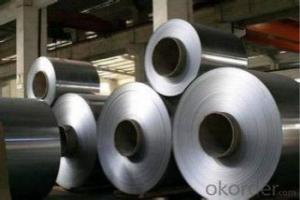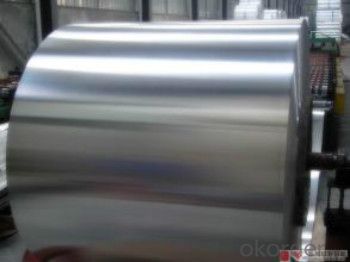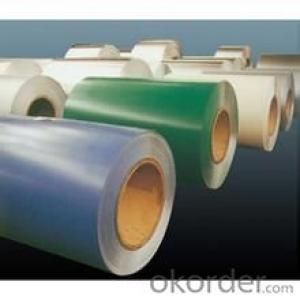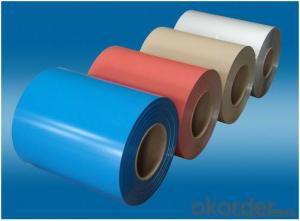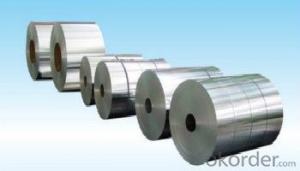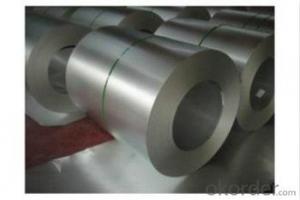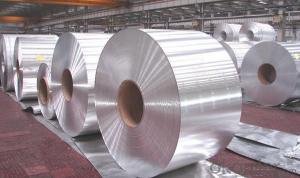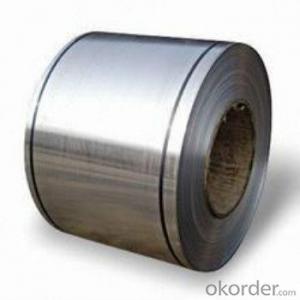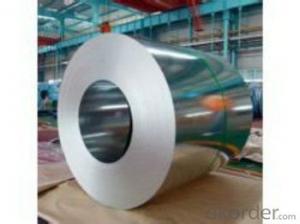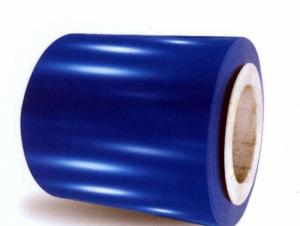Petersen Aluminum Coil - Mill Finished Aluminum Coil AA3003 Temper H14
- Loading Port:
- Shanghai
- Payment Terms:
- TT or LC
- Min Order Qty:
- 10 m.t.
- Supply Capability:
- 4000 m.t./month
OKorder Service Pledge
OKorder Financial Service
You Might Also Like
Specification
1. Aluminum Coil Description:
Aluminum coil, is a rolled product, produced in a coiled form of continuous strip, and having an ID (Inner diameter) and OD (Outer diameter).Common alloy coil are used for a wide variety of applications, alloy 1050, 1060, 3003, 3105, 3005, 5052, 5754, 5083, 6061, 8011, 8021, and so on, in thickness from 0.0065-7mm, in width from 300- 2200mm.
Aluminium coil can be deep processed into aluminium foilstock, aluminium circle, aluminium coating products, aluminium ceiling, aluminium plastic composite panel (APCP), aluminium embossed products, etc.
2.Main Features of the Aluminum Coil:
• Great ductility
• Heat conductivity
• Anti-corrosion
• Moisture resistanve
3.Aluminum Coil Images
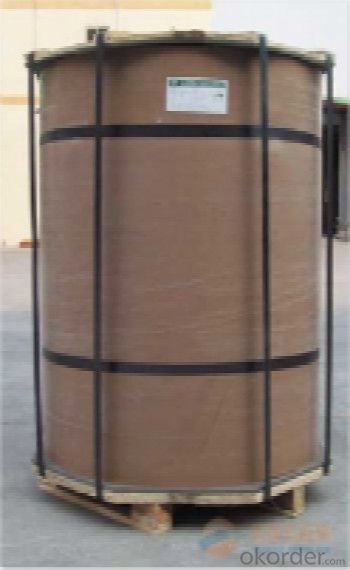
4.Aluminum Coil Specification
Aluminum Coil/Sheet | |
Main Specification | |
Alloy | AA1xxx (AA1050, AA1060, AA1070, AA1100 etc.) |
AA3xxx (AA3003, AA3004, AA3005, AA3105 etc.) | |
AA5xxx, AA6XXX (AA5052,AA5083, AA5754, AA6061, AA6062 etc.) | |
AA8xxx(AA8011, AA8006, AA8079 etc.) | |
Temper | H14,H16, H18, H22, H24, H26, H32,O/F |
Thickmess | ≥0.2mm |
Width | 30mm-2100mm |
Standard | GB/T 3880-2006 |
Special specification is available on customer's requirement | |
5.FAQ
We have organized several common questions for our clients,may help you sincerely:
(1) How to guarantee the quality of the products?
We have established the international advanced quality management system, every link from raw material to final product. we have strict quality test; we resolutely put an end to unqualified products flowing into the market. At the same time, we will provide necessary follow-up service assurance.
(2) MOQ?
For trail order, we accept 10 MT.
(3) Payment term?
30% deposit, balance against the BL copy; 100% L/C at sight
(4) What is the delivery time?
Depends on actual order, around 30 to 35 days
- Q: What’s the production standard of aluminum coil?
- GB/T3880-2006 mechanical standard GB/T3190-1996 chemical standard
- Q: This question asks for methods to preserve the lifespan of an aluminum coil.
- <p>To maintain an aluminum coil and ensure its longevity, follow these steps: Store the coil in a cool, dry place away from moisture and direct sunlight. Keep it clean by regularly removing dust and debris. Avoid scratching or denting the coil's surface. Handle the coil carefully to prevent damage. Use appropriate lubricants when necessary to reduce friction. Regularly inspect the coil for any signs of corrosion or wear and address these issues promptly. By following these practices, you can extend the life of your aluminum coil and maintain its quality.</p>
- Q: Which type of wheel is more durable, long-lasting and which wheel type would cost more, Aluminum or chrome?
- i like aluminum although it does wear easily.
- Q: Can aluminum coils be used for heat dissipation purposes?
- Yes, aluminum coils can be used for heat dissipation purposes. Aluminum has excellent thermal conductivity, allowing it to efficiently transfer heat away from a source. Aluminum coils are commonly used in various cooling applications such as air conditioning systems, refrigerators, and heat exchangers to dissipate heat effectively and maintain optimal temperatures.
- Q: Can the displacement sensor be used for real-time measurement of the aluminum coil thickness?
- Yes, you can use two sensors to measure thickness, either contact sensor or laser sensor
- Q: How do aluminum coils contribute to the aesthetics of architectural designs?
- Aluminum coils play a significant role in enhancing the aesthetics of architectural designs. One of the main reasons is their versatility in terms of shape and size. Aluminum coils can be easily formed into various shapes, making them suitable for a wide range of architectural applications. The lightweight nature of aluminum coils also contributes to their aesthetic appeal. They provide a sleek and modern look to buildings, especially when used in cladding or façade systems. The use of aluminum coils can create a visually pleasing and contemporary appearance, adding a touch of elegance to the overall design. Additionally, aluminum coils offer a wide range of color options, thanks to their ability to be coated or painted. This allows architects and designers to choose from an extensive palette of colors, enabling them to match the building's exterior with its surroundings or to create a specific mood or theme. The color choices available for aluminum coils provide endless possibilities for customization and creativity in architectural design. Furthermore, aluminum coils are highly durable and resistant to corrosion, making them suitable for long-lasting architectural applications. Their ability to withstand harsh weather conditions ensures that the building's aesthetics remain intact over time. This durability factor is essential in maintaining the visual appeal of architectural designs, as it prevents the need for frequent repairs or replacements. In summary, aluminum coils contribute to the aesthetics of architectural designs through their versatility, lightweight nature, color options, and durability. Their ability to be shaped into various forms, combined with a wide range of color choices, allows architects and designers to create visually stunning and customized buildings. The sleek and modern appearance of aluminum coils adds a touch of elegance to architectural designs, enhancing their overall aesthetics.
- Q: Can aluminum coils be used in the production of architectural panels?
- Aluminum coils have the capability to be utilized in the manufacturing process of architectural panels. Aluminum is a multifunctional material that is extensively employed in the construction sector because of its lightweight nature, durability, and resistance to corrosion. By rolling aluminum ingots into thin, flat sheets, aluminum coils provide a practical and effective means of producing architectural panels. Architectural panels, including aluminum composite panels (ACP) or solid aluminum panels, are commonly adopted as cladding systems for buildings. These panels serve both functional and aesthetic purposes by providing protection against the weather, insulation, and enhancing the overall appearance of the structure. Aluminum coils are implemented in the production of architectural panels due to their ease of forming and shaping into various designs, such as flat sheets, corrugated panels, or custom profiles. The coils can be cut to the desired size and then processed using various techniques, including bending, folding, punching, or welding, to create the desired shape and dimensions of the panels. Moreover, aluminum coils offer an extensive range of finishing options, such as anodizing, powder coating, or painting, which facilitates customization and improves the aesthetic appeal of architectural panels. These finishes not only provide a variety of color choices but also enhance the durability and resistance to weather of the panels. To summarize, the versatility, durability, and aesthetic options provided by aluminum coils make them a suitable choice for the production of architectural panels. The use of aluminum coils in the construction industry has gained popularity due to their cost-effectiveness and efficiency in creating high-quality panels that meet the functional and design requirements of modern architecture.
- Q: Explain how the temperature affects aluminum coil properties and behavior.
- <p>The relationship between aluminum coil and temperature is significant as temperature influences the coil's physical properties and performance. At lower temperatures, aluminum coils become more brittle and susceptible to cracking or breaking. As the temperature increases, aluminum's ductility improves, allowing it to be more easily shaped and formed. However, excessive heat can also lead to deformation and loss of strength. The thermal conductivity of aluminum is high, meaning it conducts heat well, which is useful in applications requiring heat transfer. Additionally, the electrical conductivity of aluminum is affected by temperature; as temperature rises, resistance increases, which can impact applications where electrical conductivity is critical.</p>
- Q: Are aluminum coils suitable for outdoor applications?
- Indeed, outdoor applications can employ aluminum coils effectively. Renowned for its exceptional resistance to corrosion, aluminum has gained popularity for outdoor usage. It does not easily succumb to rust or decay when confronted with moisture, sunlight, or severe weather conditions. Moreover, aluminum coils possess characteristics of being lightweight, resilient, and having a favorable strength-to-weight ratio, rendering them well-suited for a range of outdoor purposes, including roofing, gutters, air conditioning systems, and outdoor furniture. Furthermore, aluminum stands out as an environmentally-conscious choice as it can be recycled extensively. Consequently, aluminum coils emerge as a dependable and pragmatic option for outdoor applications.
- Q: My boyfriend sweats a lot and uses Mitchlum deodorant, a lot of it, under his armpits and waits til it dries to stop the sweating. I heard aluminium was bad for you, but he says natural deodorants don't work as well. What do you think?
- This is doctrine according to me, so Don't take it for absolute truth. I had a science teacher who said the aluminum in deodorant was bad for you because you have major arteries in your armpits that go to the rest of your body and it carries it there and is linked to things like alzheimers (please excuse my spelling). Then I had another teacher who said that that was complete rubbish. Aluminum is everywhere. If it was going to do that from deodorant, it would do it from a million other things. Oh, and certain deodorants work for certain people, others not so well. I actually have to switch types every once in a while because the one I use stops working. In my experience, the natural stuff doesn't work as well. So, you don't have to believe me, but you asked what I thought.
Send your message to us
Petersen Aluminum Coil - Mill Finished Aluminum Coil AA3003 Temper H14
- Loading Port:
- Shanghai
- Payment Terms:
- TT or LC
- Min Order Qty:
- 10 m.t.
- Supply Capability:
- 4000 m.t./month
OKorder Service Pledge
OKorder Financial Service
Similar products
Hot products
Hot Searches
Related keywords
